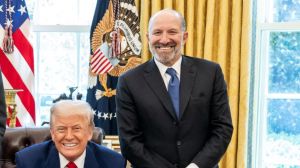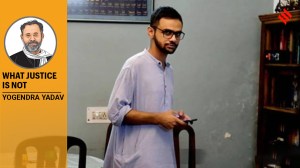Prez reference hearing: Governor can’t examine legislative competence of bills, West Bengal tells SC
The hearing would resume on September 9.
 On Tuesday, the top court said the power of judicial review forms part of the basic structure and courts cannot decline an answer to constitutional questions even if the controversy was political in nature. (File Photo)
On Tuesday, the top court said the power of judicial review forms part of the basic structure and courts cannot decline an answer to constitutional questions even if the controversy was political in nature. (File Photo)The West Bengal government Wednesday told the Supreme Court five-judge Constitution bench hearing the Presidential reference that fixing timelines for the President and Governors to act on Bills forwarded by state legislatures will not amount to amending the Constitution but ensures that the constitutional machinery functions.
Referring to past judgments, Senior Advocate Kapil Sibal appearing for the state said “the argument was… if you give a timeline, you are amending the Article. Of course not. You are ensuring the Article functions, that the constitutional machinery functions, not that you are amending it.”
The CJI B R Gavai-led bench, also comprising Justices Surya Kant, Vikram Nath, P S Narasimha and A S Chandurkar, is hearing a Reference made by President Droupadi Murmu under Article 143(1) in the wake of the SC two-judge bench ruling that fixed time limits for the President and Governors to act on Bills.
Hearing it Tuesday, Justice Nath had said that the court fixing timelines which were absent in the Constitution, would practically “amount to it amending the Constitution”.
On Wednesday, Sibal referred to a situation where the Governor sits on a Bill even after it has been returned by Assembly without any change. “The Governor says I am withholding the Bill because I believe it is unconstitutional and the State passes it again and he still withholds it. Then what happens? … if somebody files a petition, the Governor cannot be made a party. Who will defend him?… so let’s not interpret the Constitution to make it unworkable. The language will not matter, the objective will matter,” Sibal said.
The senior counsel submitted that the legislative competence of the Bill cannot be examined by the Governor and that it is the duty of the court to do so.
To Justice Narasimha’s observation that “written Constitution is lost if you take that position”, Sibal answered in the negative and said that even in Parliament, at the stage of introducing a Bill, its constitutionality is not tested.
The CJI asked if the Governor cannot reserve a Bill for consideration by the President if he or she feels it is repugnant to any Central law. Sibal said that for repugnancy, there is a solution provided in the Constitution. “But that solution is not that I sit on it and not give assent to it”.
Stressing the need for interpreting the constitution depending on the emerging fact situation, Sibal said that “the Constitution is a living document. It owes its genesis to history but owes its allegiance to the future… let’s not fall into a trap where the Governor becomes an impediment in the functioning of the Constitution. Therefore you will have to say something”.
Senior Advocate Gopal Subramaniam appearing for Karnataka said: “The reference seriously entrenches upon one of the most acknowledged coherent principles, which is democratic organ which enjoys executive power is the Cabinet form of government.”
He pointed out that the law has taken a consistent position that both President and Governor are titular heads and ultimately power resides with the Cabinet. So, also, there is the principle of collective responsibility of the House, he said, adding both principles will be violated if the President or Governor is endowed with any discretionary power in the matter of clearing Bills. “What Union indirectly does is to abrogate the fulcrum of Constitution, which is Cabinet form of government and responsibility towards legislature,” he said.
Senior Advocate Anand Sharma, appearing for Himachal Pradesh, said the doctrine of separation of powers is not an abstract theory but the foundation of the constitutional framework. He underlined that it is the legislature which is sovereign when it comes to law-making, and when it comes to interpretation, the judiciary is the final arbiter. He said that the President or Governor does not have any discretion. “It was there in the draft constitution but it was done away with. The amendment moved by B R Ambedkar was to ensure that there is no delay,” Sharma said.
He contended that the Governor’s office can’t be used to nullify the will of the people. “States have their autonomy and they must not be belittled on the whims and fancies of the Governor,” he said.
The hearing would resume on September 9.







